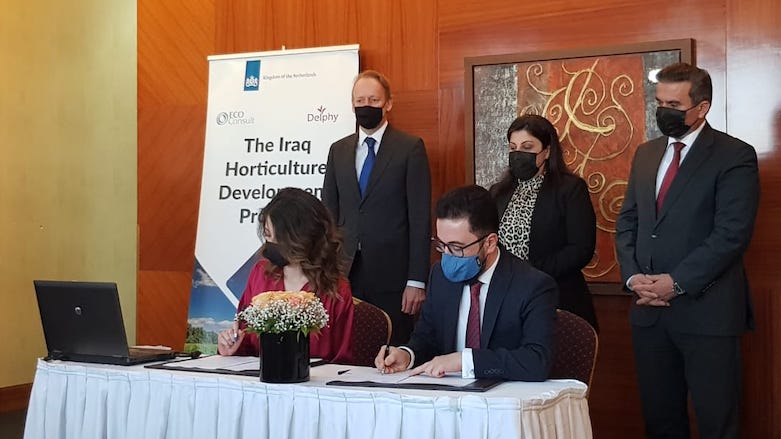Dutch-funded program signs agreement to boost agriculture sector in Kurdistan Region

ERBIL (Kurdistan 24) – The Dutch Consulate General on Monday hosted a signing ceremony for the Iraq Horticulture Development Program (IHD), funded by the Netherlands, in the attendance of senior Kurdish officials.
The agreement was signed between the IHD and implemented by ECO Consult, represented by Nawa Sarbast, and the lead partner in Erbil, Hussein Dizzaye, the CEO of Arabela Farms.
A concrete result of the support from the Netherlands to #KRI. With financial & technical support from the Netherlands, a MoU was signed with a private investor in the field of innovative agriculture. In this way #KRI can grow more, better and cheaper agricultural products. pic.twitter.com/GnXqhnIxbE
— Hans Akerboom (@jtmakerboom) December 22, 2020
The four-year program aims to increase the resilience of market systems and increase knowledge among farmers about efficient and sustainable horticulture management.
Dizzaye told Kurdistan 24 that the plan is to create a 5,000-square-meter hydroponic multi-span greenhouse in the Kurdistan Region, south of Erbil. “It will focus on the production of certain vegetables, like cherry tomatoes and colorful peppers,” he added.
He said these products are currently imported from abroad and are not available locally. As a result, the prices are quite high. “We are trying to establish a system so that those products can also be produced locally at least for the domestic market in the short-term.”
In the past, the Kurdistan Region and Iraq, in general, have been dependent on cheaper imports of agricultural products from neighboring Iran and Turkey, but now both Baghdad and Erbil plan to develop agricultural products locally for the domestic market.
Dizzaye added that the Kurdistan Region is currently suffering from a water scarcity problem and needs innovations in agriculture.
“It’s becoming less and less [the water supply]. So that’s one of the reasons that we have to consider more modern technologies,” he said. “The capital needed is quite high, but I think this investment is no longer optional, it’s a necessity to be able to continue to have a sustainable economy.”
The Dutch Consul General in Erbil, Hans Akerboom, told Kurdistan 24 that the Dutch government is “trying to support” the Kurdistan Region “to be more efficient, cheaper [like the Netherlands],” and ensure “your products are much better, so you’re less dependent on importing goods from abroad.”
He underlined that the Netherlands is the biggest producer of agriculture in the world after the United States and “as a small country, we like to share our knowledge and innovations with others.”
“We are in very close contact with Kurdistan, with the government, and also the private sector, and in this Memorandum of Understanding, we are going to invest partly as the Dutch government together with the private sector here to improve the agricultural sector here in the Kurdistan Region.”
However, he said the IHD program will initiate its activities in the Kurdistan Region, but will soon be followed by Baghdad in the central region and Basra in southern Iraq. The program will build on the Dutch government’s long-standing cooperation with the Ministry of Agriculture in Baghdad as well as with the Kurdistan Regional Government (KRG).
Akerboom said diversifying Kurdistan’s economy was also discussed by Kurdistan Region Prime Minister Masrour Barzani during a visit to the Netherlands in November to meet with his Dutch counterpart Mark Rutte.
“There is this dependence on oil, and the oil prices are very low, so this can be quite tricky.”
Read More: Kurdistan, Dutch prime ministers talk strengthening bilateral ties
During the ceremony on Monday, the KRG’s Minister of Agriculture, Begard Talabany, said the Kurdistan Region is “honored to be able to benefit from the expertise of [the Netherlands] and to provide that knowledge and expertise to farmers and investors” in Kurdistan.
“We are currently in the preparation and finalization phase for the establishment of a further cooperation that will begin in [the] near future, which is the joint advisory committee between the Kurdistan Region and the Netherlands,” Talabany said. “This Joint Advisory Committee will be providing support from both sides to make a strategic plan for the development of the agriculture sector of Kurdistan.”
Editing by Karzan Sulaivany
